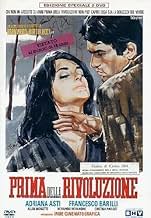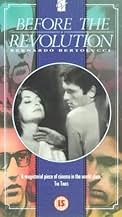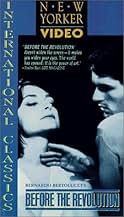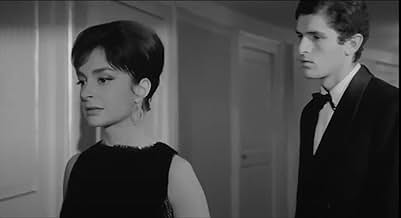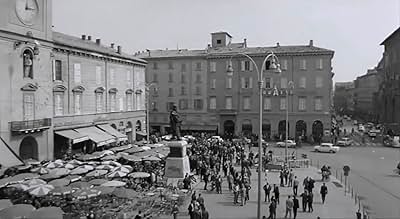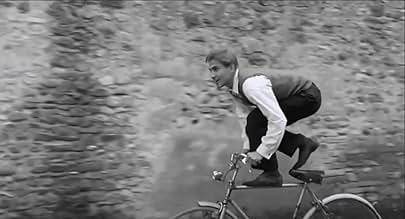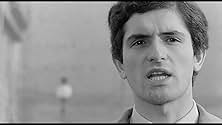Prima della rivoluzione
- 1964
- 1 घं 55 मि
IMDb रेटिंग
6.8/10
3.3 हज़ार
आपकी रेटिंग
अपनी भाषा में प्लॉट जोड़ेंFollowing the death of his friend, an Italian youth grows increasingly closer to his young aunt.Following the death of his friend, an Italian youth grows increasingly closer to his young aunt.Following the death of his friend, an Italian youth grows increasingly closer to his young aunt.
- निर्देशक
- लेखक
- स्टार
- पुरस्कार
- 2 कुल नामांकन
फ़ीचर्ड समीक्षाएं
For a while, forget about Bernardo Bertolucci's "ventures into Hollywood" (for example, "Little Buddha," featuring Keannu Reeves) and find time to see his "little-known" work, "Before the Revolution" (his second feature film, which was made in his native country and when he was just 22 years old).
More than a "nostalgic" tribute to the "present," the film is closer in spirit and style to the French New Wave films (see, for example, Jean-Luc Godard's "A Bout de Souffle" and Francois Truffaut's "Jules et Jim";as a matter of fact, Bertolucci's film was contemporaneous with these works).
In the film, you'll find a bedazzling mixture of narrative styles (those relating to camera movements and angles, editing, photographic effects and musical score;my favorites are the "optical room" scene and the old man painting by the lakeside), characters who are always "running away" from something (from social conventions and pressures, from others as well as from themselves) and for whom to live is to discourse (with other people or with themselves), and a "romantic" and "apolitical" stance toward a relevant sociopolitical issue ( in this case, the workers' uprising and the Revolution of 1948).
Initially slow and hard to get by, but the film eventually engages the viewers' attention as "love" starts to develop between the aunt (Gina) and the nephew (Fabrizio), which other people may find "scandalous," but is treated in such a casual and indifferent manner that the result is "unaffecting" (much like the way the menage-a-trois was treated in "Jules et Jim"), and as one gets to know more (or does one?) the quirky and enigmatic characters.
More than a "nostalgic" tribute to the "present," the film is closer in spirit and style to the French New Wave films (see, for example, Jean-Luc Godard's "A Bout de Souffle" and Francois Truffaut's "Jules et Jim";as a matter of fact, Bertolucci's film was contemporaneous with these works).
In the film, you'll find a bedazzling mixture of narrative styles (those relating to camera movements and angles, editing, photographic effects and musical score;my favorites are the "optical room" scene and the old man painting by the lakeside), characters who are always "running away" from something (from social conventions and pressures, from others as well as from themselves) and for whom to live is to discourse (with other people or with themselves), and a "romantic" and "apolitical" stance toward a relevant sociopolitical issue ( in this case, the workers' uprising and the Revolution of 1948).
Initially slow and hard to get by, but the film eventually engages the viewers' attention as "love" starts to develop between the aunt (Gina) and the nephew (Fabrizio), which other people may find "scandalous," but is treated in such a casual and indifferent manner that the result is "unaffecting" (much like the way the menage-a-trois was treated in "Jules et Jim"), and as one gets to know more (or does one?) the quirky and enigmatic characters.
After his début, The Grim Reaper (1962), the then 22-year old Bernardo Bertolucci made this, Before the Revolution, an often astonishing homage to the ongoing French New Wave movement and a work of almost unbelievable maturity given his age. Set very much after the revolution, presumably referring to the Italian unification, this is undoubtedly a bleak film, looking back on Italy's history with blind, fond nostalgia, and staring into the abyss of their future. Despite the occasional Marxist monologue, the film is in no ways political, and instead focuses on very human drama, with characters seemingly locked into their social roles and resigned to their fate.
The handsome and idealistic Fabrizio (Francesco Barilli) is destined to marry his childhood sweetheart Clelia (Cristina Pariset), a beautiful woman teetering on aristocracy. After his friend Agostino (Allen Midgette) drowns in a possible suicide, he falls headlong into a potentially dangerous love affair with his aunt Gina (Adriana Asti). Gina is unpredictable, highly emotional and possibly borderline mentally ill, but she is also attractive, seductive and wilful, challenging for the sullen Fabrizio. The death of Agostino clearly damages the passionate Fabrizio, whose studies of Marxism with his teacher and friend Cesare (Morando Morandini) had made him outspoken, but now finds himself blindly wandering into the bourgeoisie.
The film doesn't really have a plot as such, but is instead a collection of scenes and interplays that channel Bertolucci's somewhat pessimistic views of Italy in the 1960's. The characters seem locked in the past, a past that they weren't alive for, and as Fabrizio states, full of nostalgia for the present, as if every passing moment is somehow being snatched away from them. It's best summarised in what is undoubtedly the stand-out scene in the movie, as they visit Puck (Cecrope Barilli), a man crippled with so much debt that he is soon to lose his beloved land. While the camera stays calm and graceful throughout the film, Puck laments as the camera sweeps into their air over rivers and forests, Ennio Morricone's astounding score blaring over the visuals. It's a beautiful moment, full of sad longing that reminded me of Sam the Lion's moving monologue in The Last Picture Show (1971) - one of favourite moments in cinema.
Although this is clearly a wink to Godard and the French New Wave, Bertolucci takes a much more controlled approach to the direction. The camera often glides slowly from side to side, switching character focus as they talk, filmed in crisp black-and-white. It was this approach that caused Godard to voice his displeasure at Bertolucci after viewing his masterpiece The Conformist (1970), claiming it to be too contrived. But cinema can be anything and everything you want it to be, and this makes for beautiful cinema, anchored by a powerful performance by Asti, who makes any possible taboo regarding her incestuous relationship with her nephew become redundant. This is much more than a simple love story, this is a film about a country, it's past and present.
www.the-wrath-of-blog.blogspot.com
The handsome and idealistic Fabrizio (Francesco Barilli) is destined to marry his childhood sweetheart Clelia (Cristina Pariset), a beautiful woman teetering on aristocracy. After his friend Agostino (Allen Midgette) drowns in a possible suicide, he falls headlong into a potentially dangerous love affair with his aunt Gina (Adriana Asti). Gina is unpredictable, highly emotional and possibly borderline mentally ill, but she is also attractive, seductive and wilful, challenging for the sullen Fabrizio. The death of Agostino clearly damages the passionate Fabrizio, whose studies of Marxism with his teacher and friend Cesare (Morando Morandini) had made him outspoken, but now finds himself blindly wandering into the bourgeoisie.
The film doesn't really have a plot as such, but is instead a collection of scenes and interplays that channel Bertolucci's somewhat pessimistic views of Italy in the 1960's. The characters seem locked in the past, a past that they weren't alive for, and as Fabrizio states, full of nostalgia for the present, as if every passing moment is somehow being snatched away from them. It's best summarised in what is undoubtedly the stand-out scene in the movie, as they visit Puck (Cecrope Barilli), a man crippled with so much debt that he is soon to lose his beloved land. While the camera stays calm and graceful throughout the film, Puck laments as the camera sweeps into their air over rivers and forests, Ennio Morricone's astounding score blaring over the visuals. It's a beautiful moment, full of sad longing that reminded me of Sam the Lion's moving monologue in The Last Picture Show (1971) - one of favourite moments in cinema.
Although this is clearly a wink to Godard and the French New Wave, Bertolucci takes a much more controlled approach to the direction. The camera often glides slowly from side to side, switching character focus as they talk, filmed in crisp black-and-white. It was this approach that caused Godard to voice his displeasure at Bertolucci after viewing his masterpiece The Conformist (1970), claiming it to be too contrived. But cinema can be anything and everything you want it to be, and this makes for beautiful cinema, anchored by a powerful performance by Asti, who makes any possible taboo regarding her incestuous relationship with her nephew become redundant. This is much more than a simple love story, this is a film about a country, it's past and present.
www.the-wrath-of-blog.blogspot.com
10zetes
Before the Revolution, Bernardo Bertolucci's second film, is kind of a mess. He was only 22 when he made it, and he must have made it immediately after he finished his first film, Grim Reaper. It's obvious that he's a genius from this film. Like I said, it's kind of a mess, but no more beautiful mess has ever been created in the cinema.
The story is difficult to follow at times, but it is basically about a young bourgeois man who falls in love with his young aunt. Their relationship is socially unacceptable, so it immediately begins to break apart. As it does, politics rush into the film, confused politics, probably representing Bertolucci's own conflicting feelings at this point. The whole film feels very personal.
I don't know. I really didn't catch too much of, well, what's going on. Which sounds bad, but there's a good reason for my missing everything: Bertolucci's direction is breathtaking. It is a nice cross between French New Wave and the Modernist movement that the Italian filmmakers were going through at the time. Bertolucci throws every single cinematic trick into the film that he can fathom. Everything works, though. It's showy, to be sure, but it's never less than one of the most beautiful things I've ever experienced. It never seems less than amazing. The emotions of the film - and they really hit home, even if the story is difficult to follow - are fractured and manic.
I need to watch Before the Revolution again. I feel, though, that even if I find it completely flawed the second time around, it could be nothing less than the greatest flawed masterpiece ever produced. 10 years after Before the Revolution, Bernardo Bertolucci directed what I consider my third favorite film, Last Tango in Paris. By then, he had perfected his style. I'll be adding another Bertolucci film to my list of favorites tonight.
The story is difficult to follow at times, but it is basically about a young bourgeois man who falls in love with his young aunt. Their relationship is socially unacceptable, so it immediately begins to break apart. As it does, politics rush into the film, confused politics, probably representing Bertolucci's own conflicting feelings at this point. The whole film feels very personal.
I don't know. I really didn't catch too much of, well, what's going on. Which sounds bad, but there's a good reason for my missing everything: Bertolucci's direction is breathtaking. It is a nice cross between French New Wave and the Modernist movement that the Italian filmmakers were going through at the time. Bertolucci throws every single cinematic trick into the film that he can fathom. Everything works, though. It's showy, to be sure, but it's never less than one of the most beautiful things I've ever experienced. It never seems less than amazing. The emotions of the film - and they really hit home, even if the story is difficult to follow - are fractured and manic.
I need to watch Before the Revolution again. I feel, though, that even if I find it completely flawed the second time around, it could be nothing less than the greatest flawed masterpiece ever produced. 10 years after Before the Revolution, Bernardo Bertolucci directed what I consider my third favorite film, Last Tango in Paris. By then, he had perfected his style. I'll be adding another Bertolucci film to my list of favorites tonight.
While hailed as many as a masterpiece (or near), I struggled with Bertolucci's 2nd film, made when he was only 23, although I am a fan of his in general. Beautifully shot, great use of music and unconventional editing, the film is excellent on a film-making and craft level (although it perhaps borrows too liberally from leading film-makers of the era, especially Godard, Antonioni and Resnais).
The story of a young bourgeois man trying to come to terms with his tear between his attraction to communism and his desire for an easier life leads him into an incestuous affair with his somewhat older aunt. I found it's themes somewhat muddled, alternating between being heavy-handedly spelled out, or so obtuse I wasn't sure what a given scene was saying.
The acting in particular seems a bit all over the place; understated to the point of flatness in one scene, and then almost theatrically over the top the next. At the end I felt glad I'd seen the film, but it didn't stick with me the way Bertolucci's first film "La Commare Secca" or his third "Partner" did. ("Partner" deals with some of the same themes, but in a far more playful, often comedic way). There was a film-school sort of pretentiousness and emotional distance in "Before the Revolution that kept me from feeling moved or from being led to think deeply about the ideas.
That said, I am willing to revisit it and see if my reaction changes, and certainly I enjoyed Bertolucci's already masterful use of image and sound, even if the ends he was using them to were a bit muddled.
The story of a young bourgeois man trying to come to terms with his tear between his attraction to communism and his desire for an easier life leads him into an incestuous affair with his somewhat older aunt. I found it's themes somewhat muddled, alternating between being heavy-handedly spelled out, or so obtuse I wasn't sure what a given scene was saying.
The acting in particular seems a bit all over the place; understated to the point of flatness in one scene, and then almost theatrically over the top the next. At the end I felt glad I'd seen the film, but it didn't stick with me the way Bertolucci's first film "La Commare Secca" or his third "Partner" did. ("Partner" deals with some of the same themes, but in a far more playful, often comedic way). There was a film-school sort of pretentiousness and emotional distance in "Before the Revolution that kept me from feeling moved or from being led to think deeply about the ideas.
That said, I am willing to revisit it and see if my reaction changes, and certainly I enjoyed Bertolucci's already masterful use of image and sound, even if the ends he was using them to were a bit muddled.
On occasion while watching Bernardo Bertoulcci's Before the Revolution, which I have done about four times within the past year, I really felt like I was watching someone with a full love of cinema. Not just of how it can distort our perceptions of reality by how close or far or following the subjects are, but that there's a certain purity to it. When a filmmaker has this much bursting out of him at 22, 23 years old, you're bound to find it coming out much like someone that age- still on the brink of life, full of ideas, and still treated in a couple of minor, even unintentional ways, as a kid.
Bertolucci tapped into the vein of the changing of the guard in European cinema with vitality. Like in poetry, the moods and music in the language (or, here, the grammar of film itself) tends to move along with the expressions used to make it so personal you know no one else could have done it this way. Even when it might stumble the film almost seems to pick itself back up, plunging us right into the gut of its subject matter. At times only Last Tango in Paris, Bertolucci's masterpiece, came close with its honesty of what's going on in the world for these people.
And, in truth, the film's structure would not work without some level of honesty to the viewer, or at the least saying with the random, seemingly sometimes mundane set of events 'it's got to be this way, at least for this character.' How much of it is based from Bertolucci's life I'm not certain. But his lead character, Fabrizio (Francesco Barilli, in a splendidly conflicted performance), is not necessarily a great young future leader of men or something. He's a bourgeois -the word is used quite a number of times in the film- and filled with ideals about a Marxist-style revolution, perhaps.
For the most part though he wanders, thinks in quotes, and is close to his Aunt Gina (Adriana Asti, perfect for the part). It is dealing with this relationship that the filmmaker has to find his stride most, and he does. It goes from quiet, to cute, to talkative, to confused, then to something more risqué- passionate. When the character's cross the line, one may want to suddenly find some of what proceeds as taboo. It's not the case.
What turns Before the Revolution into something not as troubling as the subject matter might appear, Bertolucci utilizes a style that corresponds with the scatter-shot frame of mind in the character's story. The plot is 'linear', but there are times where the sort of Italian frame of romanticism comes into play as well. Because the poetry of the emotions helps make this not as potentially pretentious as some of these scenes could come across, it is not without notice that upon once or twice times the subject matter goes into confusing points.
The scenes late in the film involving Puck, for example, become so into the realm of the literary that it goes beyond interesting and into the dangerous realm of the self-indulgent (which is understandable given the filmmaker's talents). Though Italian to the bone, here and there I almost wondered if at times Truffaut and Godard, switching off like hitters in a batting cage, were in the back of Bertolucci's mind as he wrote the script or filmed a scene.
It doesn't hurt at all, of course, that two great musicians contribute to the film. One is Ennio Morricone, who co-wrote the music and performed for the film, and though not mentioned on IMDb, the great Gato Barbieri is also credited in the music. It's not just them but also the whole backbone of the music in the film. It adds that kick that is in many an Italian romance/drama, and also touches of ironic humor, of the joyfulness of youth (i.e. riding the bike early on), and songs used for effectiveness ahead of its time.
By also entrusting much of his own vision into the hands and eyes of Aldo Scavarda, Bertolucci gets cinematography that makes it apparent how with many of his films his style is apparent in every one. That it starts off so rough, yet with delicacy, and combining it with a lot to contemplate in terms of what love is, what politics mean for the well off and the not-so well off, and an uneasy feeling of hopelessness. It's one of the more breathtaking visions to come from a director younger than 25 in the post-Italian new-wave.
It's not too much of a wonder then Scorsese lists this as his primary influence to make Who's That Knocking at my Door. 9.5/10
Bertolucci tapped into the vein of the changing of the guard in European cinema with vitality. Like in poetry, the moods and music in the language (or, here, the grammar of film itself) tends to move along with the expressions used to make it so personal you know no one else could have done it this way. Even when it might stumble the film almost seems to pick itself back up, plunging us right into the gut of its subject matter. At times only Last Tango in Paris, Bertolucci's masterpiece, came close with its honesty of what's going on in the world for these people.
And, in truth, the film's structure would not work without some level of honesty to the viewer, or at the least saying with the random, seemingly sometimes mundane set of events 'it's got to be this way, at least for this character.' How much of it is based from Bertolucci's life I'm not certain. But his lead character, Fabrizio (Francesco Barilli, in a splendidly conflicted performance), is not necessarily a great young future leader of men or something. He's a bourgeois -the word is used quite a number of times in the film- and filled with ideals about a Marxist-style revolution, perhaps.
For the most part though he wanders, thinks in quotes, and is close to his Aunt Gina (Adriana Asti, perfect for the part). It is dealing with this relationship that the filmmaker has to find his stride most, and he does. It goes from quiet, to cute, to talkative, to confused, then to something more risqué- passionate. When the character's cross the line, one may want to suddenly find some of what proceeds as taboo. It's not the case.
What turns Before the Revolution into something not as troubling as the subject matter might appear, Bertolucci utilizes a style that corresponds with the scatter-shot frame of mind in the character's story. The plot is 'linear', but there are times where the sort of Italian frame of romanticism comes into play as well. Because the poetry of the emotions helps make this not as potentially pretentious as some of these scenes could come across, it is not without notice that upon once or twice times the subject matter goes into confusing points.
The scenes late in the film involving Puck, for example, become so into the realm of the literary that it goes beyond interesting and into the dangerous realm of the self-indulgent (which is understandable given the filmmaker's talents). Though Italian to the bone, here and there I almost wondered if at times Truffaut and Godard, switching off like hitters in a batting cage, were in the back of Bertolucci's mind as he wrote the script or filmed a scene.
It doesn't hurt at all, of course, that two great musicians contribute to the film. One is Ennio Morricone, who co-wrote the music and performed for the film, and though not mentioned on IMDb, the great Gato Barbieri is also credited in the music. It's not just them but also the whole backbone of the music in the film. It adds that kick that is in many an Italian romance/drama, and also touches of ironic humor, of the joyfulness of youth (i.e. riding the bike early on), and songs used for effectiveness ahead of its time.
By also entrusting much of his own vision into the hands and eyes of Aldo Scavarda, Bertolucci gets cinematography that makes it apparent how with many of his films his style is apparent in every one. That it starts off so rough, yet with delicacy, and combining it with a lot to contemplate in terms of what love is, what politics mean for the well off and the not-so well off, and an uneasy feeling of hopelessness. It's one of the more breathtaking visions to come from a director younger than 25 in the post-Italian new-wave.
It's not too much of a wonder then Scorsese lists this as his primary influence to make Who's That Knocking at my Door. 9.5/10
क्या आपको पता है
- ट्रिवियाBernardo Bertolucci was only 22 when he made this film.
- कनेक्शनFeatured in Nathalie... (2003)
टॉप पसंद
रेटिंग देने के लिए साइन-इन करें और वैयक्तिकृत सुझावों के लिए वॉचलिस्ट करें
- How long is Before the Revolution?Alexa द्वारा संचालित
विवरण
बॉक्स ऑफ़िस
- दुनिया भर में सकल
- $8,438
- चलने की अवधि1 घंटा 55 मिनट
- रंग
- ध्वनि मिश्रण
- पक्ष अनुपात
- 1.85 : 1
इस पेज में योगदान दें
किसी बदलाव का सुझाव दें या अनुपलब्ध कॉन्टेंट जोड़ें


![Trailer [OV] देखें](https://m.media-amazon.com/images/M/MV5BNWRiN2E3YjYtNmI2MC00ZjdmLWE2N2EtYWFjYTNjZTRmZTZiXkEyXkFqcGdeQXRodW1ibmFpbC1pbml0aWFsaXplcg@@._V1_QL75_UX500_CR0)
